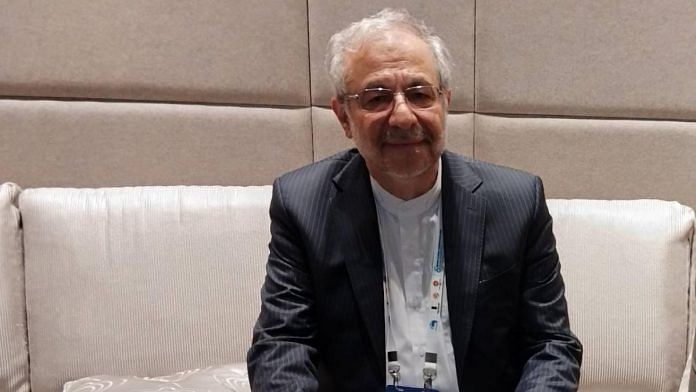New Delhi: The Iranian foreign ministry is actively trying to find a solution for faster implementation of the Chabahar Port Project despite “technical issues”, one of Iran’s top diplomats Seyed Rasoul Mousavi told ThePrint last week.
Mousavi serves as assistant to Iranian foreign minister Hossein Amir-Abdollahian and is director general, West Asia, at Iran’s Ministry of Foreign Affairs.
Speaking exclusively to ThePrint on the sidelines of the just-concluded 6th Indian Ocean conference in Dhaka, Bangladesh, Mousavi said: “We have some technical issues (when it comes) to working with India in Chabahar. I myself am trying to find a solution with the foreign ministry. We have had good progress.”
He did not, however, specify the technical issues.
The Chabahar Port Project is India’s first foreign port project. However, in 2019, progress on the project began to slow down owing to deteriorating US-Iran bilateral relations and sanctions imposed on Tehran by the then-Donald Trump administration in America.
“If we have more cooperation on Chabahar, then the Indian Ocean will have a new gate for (trade in) Central Asia, Afghanistan, Eurasia,” Mousavi said, further batting for the project.
For India, the Chabahar Port — located in southeastern Iran, on the Gulf of Oman — is strategic as it would open a new trade route for Indian goods to Afghanistan and Central Asia, thereby bypassing the existing land route through Pakistan.
In 2016, PM Narendra Modi and then-Iranian President Hassan Rouhani had signed a deal for the port project, with New Delhi pledging an investment of $500 million. In 2018, the Indian government took over the operations of a part of the Shahid Beheshti Port in Chabahar.
In March 2021, India’s then-shipping minister Mansukh Mandaviya had said full-scale operations at the port would begin by end-May that year, but this did not happen.
China’s growing influence in the Middle East — especially after it recently helped broker peace between regional foes Iran and Saudi Arabia — has also emerged as a cause for concern as Beijing seeks to expand its Belt and Road Initiative (BRI) infrastructure project.
According to Srikanth Kondapalli, dean of the School of International Studies and a professor of China studies at Jawaharlal Nehru University, there are several strategic uncertainties surrounding the Chabahar Port Project.
“There’s uncertainty in the US-Iran relationship and fears about the spillover of sanctions. The Ukraine War has complicated this further. Local currency transactions are also an issue. Then, there’s the possibility of Chinese intervention in the port, especially after Beijing finalised a 25-year partnership with Tehran,” he told ThePrint.
Last January, Iran and China’s 25-year “strategic accord” which covers economic, military and security cooperation, came into force.
That said, Iran has expressed openness to signing a long-term contract with India for the Chabahar Port.
Also Read: Iran complains India is delaying Chabahar, offers ‘cheaper’ fertilisers to New Delhi
‘Spoke to Ajit Doval on transformation of INSTC’
Earlier this month, India’s National Security Adviser (NSA) Ajit Doval visited Tehran where he held discussions with Iranian President Ebrahim Raisi on the Chabahar project, economic relations and other issues.
The meeting came on the heels of China’s growing influence in the Middle East.
Mousavi confirmed to ThePrint that the International North-South Transport Corridor (INSTC) — an ambitious 7,200-km multi-modal transport route between India, Iran, Azerbaijan, Russia, Central Asia and Europe — was discussed during this meeting as well.
“A few weeks ago, Mr Ajit Doval came to Tehran. We had a very good discussion about how to accelerate the transformation of everything in INSTC,” he said.
The INSTC is also a strategic infrastructure project for India. In 2000, the transport corridor was first conceptualised under a trilateral agreement signed by India, Iran and Russia.
In March 2021, External Affairs Minister Dr. S. Jaishankar went as far as to say that New Delhi has proposed the inclusion of the Chabahar Port in INSTC.
The INSTC, like the Chabahar Port, has seen troubles too.
In July 2022, the first shipment through the INSTC arrived at Mumbai’s Jawaharlal Nehru Port from Russia’s Astrakhan Port. However, owing to major changes in the region, especially in the wake of the Ukraine War and the Taliban takeover in Afghanistan, overall flow of goods through the INSTC has been slow.
Asked about the slow functioning of the INSTC, Mousavi argued that it is a multi-vector project involving many moving parts from land routes, to railroads and sealines.
He added that certain railroads between Iran and Russia also need work. “Iran and Russia are working to complete the Rasht-Astara railroad. It’s a gap of 200 km,” Mousavi told ThePrint.
He added that the “standardisation” of the Rasht-Astara railroad is different from that in former Soviet states or in eastern Russia and other countries.
Xi Jinping’s ‘new strategy for peaceful global activities’
Regional connectivity projects like the Chabahar Port Project and the INSTC have been viewed as counters to China’s BRI.
Also, earlier this month, national security advisers from the US, UAE and India met in Saudi Arabia reportedly to discuss a possible major joint infrastructure project to connect the Gulf and Arab countries to India via sea routes, as a possible counter to Chinese influence in the region.
Asked about these developments, Mousavi heaped praise on Chinese President Xi Jinping’s “new strategy for peaceful global activities” but added that Tehran maintains good relations with both New Delhi and Beijing.
He further said that India’s foreign policy has proven to be “multi-aligned” in recent years.
(Edited by Nida Fatima Siddiqui)
Also Read: India exempted from sanctions because of its value to Chabahar port & Afghanistan railway line: US



